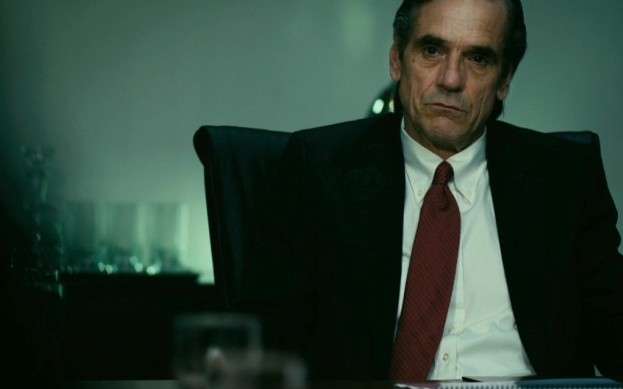Margin Call | reviews, news & interviews
Margin Call
Margin Call
JC Chandor's debut feature is a chilling portrait of the financial food chain at work

Margin Call, a smart, taut and brutally frank portrait of the money game, asks a lot of its audience. A movie about traders as, if not quite good guys, then at least rounded guys? It’s not a trick Oliver Stone ever managed to pull off, and he tried twice. Refusing to deal in the Hollywood placebos of idealism and redemption, this is not a product that the big studios would have gone anywhere near.
And yet Chandor’s pugnacious script has managed to attract a cast of gilt-edged heavyweights presumably working for peanuts. Among them is Stanley Tucci as a risk management expert who is marched out of the building at the start of a day of bloodletting, but not before he’s handed over the details of some numbers he’s been running through the system in which it’s suggested that the bank has been “pushing the risk profile without raising any red flags”. He suspects Demi Moore’s senior shark of having a hand in his demise, a hunch more or less confirmed by his louche, lanky colleague played by Paul Bettany. As night lengthens the news starts to travel northwards up the food chain, past Kevin Spacey’s floor boss (pictured below) all the way to Jeremy Irons’s head honcho, who choppers in to lead the following day’s earth-scorching fire sale.
 What one might term his budgetary shortfall has given Chandor the freedom to make the right kind of film about the corrosive power of money. Give or take the odd exchange in cars or strip joints and one lovely early-morning scene between Tucci and Bettany on a Brooklyn doorstep, almost everything is set in lonely rooms at night, usually with two characters telling each other stuff as they contemplate the bleakness of tomorrow. Simplicity extends to those parts of the script which might otherwise confound. An ancillary running joke, there entirely to help the audience, is that the higher-ups don’t understand financial gobbledygook. “Speak as you might to a young child or a golden retriever,” Irons says to the young messenger bringing bad news.
What one might term his budgetary shortfall has given Chandor the freedom to make the right kind of film about the corrosive power of money. Give or take the odd exchange in cars or strip joints and one lovely early-morning scene between Tucci and Bettany on a Brooklyn doorstep, almost everything is set in lonely rooms at night, usually with two characters telling each other stuff as they contemplate the bleakness of tomorrow. Simplicity extends to those parts of the script which might otherwise confound. An ancillary running joke, there entirely to help the audience, is that the higher-ups don’t understand financial gobbledygook. “Speak as you might to a young child or a golden retriever,” Irons says to the young messenger bringing bad news.
The film has the grammar of a money thriller – there is a lot of talk about numbers doing scary things on monitor screens – but this is not about outcomes or denouements. We know that “the biggest bag of odorous excrement ever in the history of capitalism”, as Irons calls it, is about to make contact with the fan and impact on the lives of many millions. Margin Call is about how the figures trapped with this terrible foreknowledge manoeuvre themselves into position. Of the underlings, Zachary Quinto’s peppy number-cruncher is set to rise, while Penn Badgley’s weepy pretty-boy trader frets increasingly about the chop.
Among the piercingly honest facets of Chandor’s tale about the ethics of selling is the almost total absence of sex - or its more lasting consequence, family. Moore impressively plays the only female character with any stature. In one scene, she and Simon Baker's boardroom ballbreaker talk as if the female cleaner between them in the elevator simply doesn't exist. The cost of her rise is silently totted up when, thrown into proximity with Tucci, she asks him if he has any children. Three, he replies, and knows from the hurt look of her hatchet face not to ask back.
 The biggest beast in this concrete jungle that never sleeps, captured in spooky night-flight shots, is Irons’s mid-Atlantic raptor (pictured left), hair styled in a greasy throwback to Gordon Gekko and prowling the corridors like a Renaissance assassin. It’s a ridiculous performance in almost all ways, but maybe this is one figure Chandor is unable or unwilling to humanise. Bettany’s swaggering Englishman knows the rules of the game. Tucci has a lovely speech littered with numbers about the bridge he once built as a socially useful engineer. We know we're meant to root for Spacey because he loves his dying pooch. Indeed, he invests his long-serving trading boss with a decency which seems a little too much until, against his will, he must put that decency at the service of his employers.
The biggest beast in this concrete jungle that never sleeps, captured in spooky night-flight shots, is Irons’s mid-Atlantic raptor (pictured left), hair styled in a greasy throwback to Gordon Gekko and prowling the corridors like a Renaissance assassin. It’s a ridiculous performance in almost all ways, but maybe this is one figure Chandor is unable or unwilling to humanise. Bettany’s swaggering Englishman knows the rules of the game. Tucci has a lovely speech littered with numbers about the bridge he once built as a socially useful engineer. We know we're meant to root for Spacey because he loves his dying pooch. Indeed, he invests his long-serving trading boss with a decency which seems a little too much until, against his will, he must put that decency at the service of his employers.
In other hands, Margin Call could easily have been 100 minutes of unsightly cock-waving. Instead, it is subtle and hefty and just downright sorrowful. Probably Chandor's characters tell one another too much stuff, as if they’re refugees from a play. This is a film where the pictures don’t by any means do most of the talking. But then the words are very good. Take Irons's definition of money: “pieces of paper with pictures on it so we don’t have to kill each other to get something to eat”.
Watch the trailer to Margin Call
rating
Explore topics
Share this article
The future of Arts Journalism
You can stop theartsdesk.com closing!
We urgently need financing to survive. Our fundraising drive has thus far raised £49,000 but we need to reach £100,000 or we will be forced to close. Please contribute here: https://gofund.me/c3f6033d
And if you can forward this information to anyone who might assist, we’d be grateful.

Subscribe to theartsdesk.com
Thank you for continuing to read our work on theartsdesk.com. For unlimited access to every article in its entirety, including our archive of more than 15,000 pieces, we're asking for £5 per month or £40 per year. We feel it's a very good deal, and hope you do too.
To take a subscription now simply click here.
And if you're looking for that extra gift for a friend or family member, why not treat them to a theartsdesk.com gift subscription?
more Film
 After the Hunt review - muddled #MeToo provocation
Julia Roberts excels despite misfiring drama
After the Hunt review - muddled #MeToo provocation
Julia Roberts excels despite misfiring drama
 Ballad of a Small Player review - Colin Farrell's all in as a gambler down on his luck
Conclave director Edward Berger swaps the Vatican for Asia's sin city
Ballad of a Small Player review - Colin Farrell's all in as a gambler down on his luck
Conclave director Edward Berger swaps the Vatican for Asia's sin city
 London Film Festival 2025 - Bradley Cooper channels John Bishop, the Boss goes to Nebraska, and a French pandemic
... not to mention Kristen Stewart's directing debut and a punchy prison drama
London Film Festival 2025 - Bradley Cooper channels John Bishop, the Boss goes to Nebraska, and a French pandemic
... not to mention Kristen Stewart's directing debut and a punchy prison drama
 London Film Festival - from paranoia in Brazil and Iran, to light relief in New York and Tuscany
'Jay Kelly' disappoints, 'It Was Just an Accident' doesn't
London Film Festival - from paranoia in Brazil and Iran, to light relief in New York and Tuscany
'Jay Kelly' disappoints, 'It Was Just an Accident' doesn't
 Iron Ladies review - working-class heroines of the Miners' Strike
Documentary salutes the staunch women who fought Thatcher's pit closures
Iron Ladies review - working-class heroines of the Miners' Strike
Documentary salutes the staunch women who fought Thatcher's pit closures
 Blu-ray: The Man in the White Suit
Ealing Studios' prescient black comedy, as sharp as ever
Blu-ray: The Man in the White Suit
Ealing Studios' prescient black comedy, as sharp as ever
 The Woman in Cabin 10 review - Scandi noir meets Agatha Christie on a superyacht
Reason goes overboard on a seagoing mystery thriller
The Woman in Cabin 10 review - Scandi noir meets Agatha Christie on a superyacht
Reason goes overboard on a seagoing mystery thriller
 London Film Festival 2025 - crime, punishment, pop stars and shrinks
Daniel Craig investigates, Jodie Foster speaks French and Colin Farrell has a gambling habit
London Film Festival 2025 - crime, punishment, pop stars and shrinks
Daniel Craig investigates, Jodie Foster speaks French and Colin Farrell has a gambling habit
 I Swear review - taking stock of Tourette's
A sharp and moving tale of cuss-words and tics
I Swear review - taking stock of Tourette's
A sharp and moving tale of cuss-words and tics
 A House of Dynamite review - the final countdown
Kathryn Bigelow's cautionary tale sets the nuclear clock ticking again
A House of Dynamite review - the final countdown
Kathryn Bigelow's cautionary tale sets the nuclear clock ticking again
 theartsdesk Q&A: Idris Elba on playing a US President faced with a missile crisis in 'A House of Dynamite'
The star talks about Presidential decision-making when millions of lives are imperilled
theartsdesk Q&A: Idris Elba on playing a US President faced with a missile crisis in 'A House of Dynamite'
The star talks about Presidential decision-making when millions of lives are imperilled

Add comment